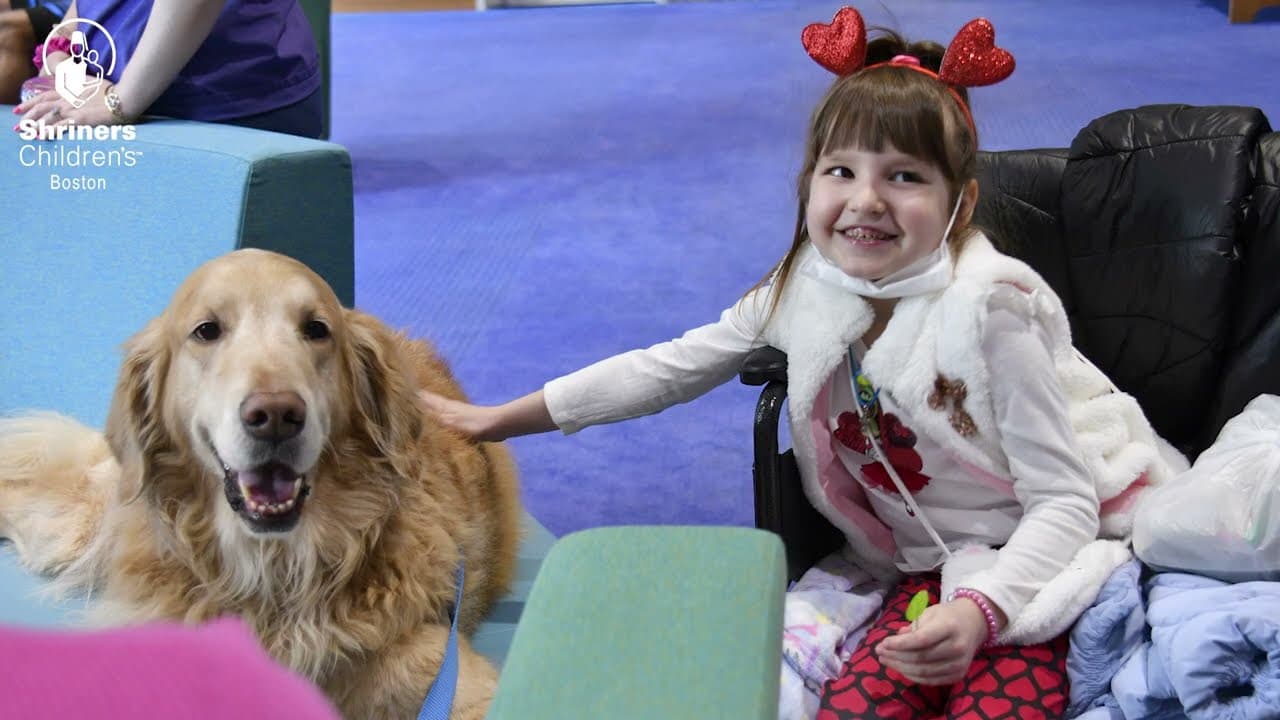Pet Therapy Provides Comfort and Companionship at Shriners Children’s Boston

Rayna the therapy dog (pictured) is a regular visitor to Shriners Children's Boston, bringing plenty of smiles to patients.
Every dog owner knows the joy a pet brings to everyday life. At Shriners Children’s Boston, volunteer dog and handler teams share that joy with our patients during monthly pet therapy sessions. These special visits not only lift patients’ spirits, but also help facilitate the healing process in a unique and powerful way.
Child life specialist Brooke Allen was determined to begin a pet therapy program when she started working at Shriners Children’s Boston in 2015. Her vision became a reality in 2017 after she formed a partnership with Scituate, Massachusetts-based Dogs Building Opportunities for Nurturing and Emotional Support (Dog B.O.N.E.S).
“There has been so much research done about the benefits of patients interacting with animals,” said Brooke. “Pet therapy is an important modality for our patients to create normalization while they are in the hospital. It also helps to reduce anxiety and stress, especially if a child is very anxious about their treatment.”

The dogs that visit Shriners Children’s Boston have all gone through extensive training to become certified therapy animals, through Dog B.O.N.E.S. or another accredited organization. They must demonstrate that they can listen to their handler and follow basic commands when interacting with others. Each team is also required to complete a grooming checklist before meeting with patients.
While the benefits of pet therapy are clear, the relationships formed during each session are hard for clinicians to describe. “What happens when our patients interact with a dog is something you can’t fully explain,” said Brooke. “The dog doesn’t care what language they speak or what their injuries look like, which helps children build self-esteem and self-confidence. That aspect of our program is truly unique.”
Before a pet therapy team can earn their Shriners Children’s Boston ID badges, they must meet with Brooke to ensure they are a good fit for the patient population and environment. Therapy dogs typically meet with inpatients individually in the hospital recreation area, whereas outpatient group sessions take place in the lobby. Dog and handler teams are volunteers, often rearranging their work schedules, or taking time off, to fit in a visit.
Arryn and her golden retriever, Juno, have been part of the Shriners Children’s Boston pet therapy program since it began. “Our visits to Shriners are always emotional and rewarding. The patients’ faces light up when they see Juno,” said Arryn. "Their lives have been turned upside down, some now living in a strange country. The little bit that Juno and I can do to make their day better is worth every moment of our time.”

Juno the therapy dog (pictured) brings her Shriners Children's Boston ID badge, water and her favorite slipper to every pet therapy session.
Participating in pet therapy helps patients achieve therapeutic goals while giving them a bright spot to look forward to in their day. It also offers comfort to patients who are unexpectedly away from home for a long period. “Part of our role in the child life department is to help patients build positive memories in the hospital,” said Brooke. “If a patient is missing their dog or pet at home, it gives them an opportunity to have that bond. It can also help us to build rapport by having a conversation about their pet, what they miss about them, and what their relationship is like.”
Brooke has recently expanded the pet therapy program to include employees. The first session filled quickly with 30 staff members participating. “It’s such a nice thing to be able to provide,” she said. “With all of the stress our staff can experience in a day, it allows them to take a breath and be in the moment.”
Shriners Children’s Boston typically has a roster of four to five pet therapy teams that rotate for monthly sessions. The program includes dogs of various breeds and ages, making every session different and unique to their personality. When they have follow-up treatment scheduled, patients often ask if pet therapy will be happening. Brooke recalls the excitement of families who have had the chance to see Juno during visits a few years apart. “They can’t believe it is the same dog,” she said. “It is a wonderful moment for parents and patients.”
At 13-years-old, Juno has spent over half of her life bringing joy to patients at Shriners Children’s Boston. “She is beginning to slow down, but we will continue our visits until Juno tells me she is too tired,” said Arryn. “We have been so lucky to spend time at Shriners. Brooke has implemented an incredible pet therapy program, and I am very proud to be a part of it.”

Four-year-old Milo gives a kiss to a new friend during his latest pet therapy visit to Shriners Children's Boston.
Keep In Touch
Join our mailing list to stay up to date on everything that's happening at Shriners Children's.